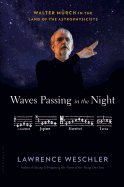
Waves Passing in the Night: Walter Murch in the Land of the Astrophysicists by Lawrence Weschler, author of Pulitzer Prize finalist Mr. Wilson's Cabinet of Wonder, is a profile of legendary sound editor Walter Murch's persistent attempts to promote his potentially revelatory theories in the field of astrophysics. It might seem like an odd preoccupation for a man known for his groundbreaking work on films such as Apocalypse Now and The Godfather, but Weschler makes the case for Murch as a borderline-obsessive polymath with insatiable curiosity and far-reaching insights. Murch has spent decades investigating and promoting his own updated interpretation of the centuries-old Titius-Bode law, which hypothesized that--to simplify things greatly--planets and moons are distributed in predictable, mathematically consistent patterns. His ideas have a number of complicated corollaries, including an elegant link between the positions of the planets and notes on a musical scale.
Murch has run into difficulty introducing these ideas to the insular and highly technical community of astrophysicists, however, who consider his elaborations on Titius-Bode to be little more than numerology. One of the more obliging scientists Weschler talks to concludes, "Murch comes off as a charming amateur, who is having a good time playing with numbers, but there is nothing new or profound in what he is finding." Regardless of whether Murch's ideas are scientifically accurate, though, Waves Passing in the Night makes incisive points about the impenetrability of modern physics and the sad decline of the amateur scientist, whose unorthodox thinking once led to profound discoveries. --Hank Stephenson, bookseller, Flyleaf Books

